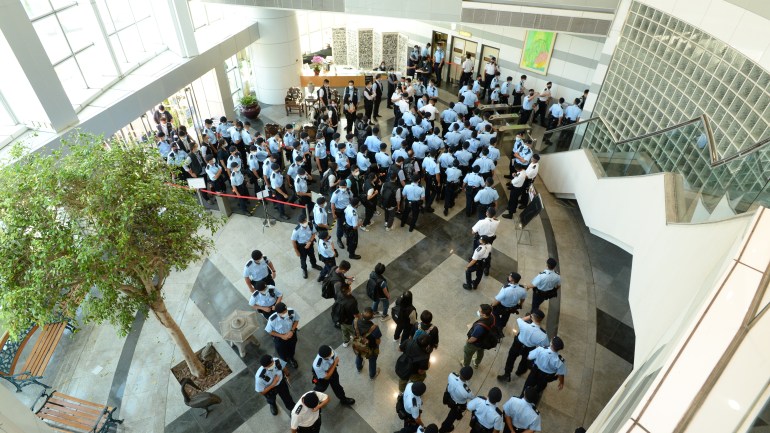Hong Kong police arrest Apple Daily editor, directors, raid HQ
Hundreds of officers search group’s headquarters after five arrested under National Security Law, accused of ‘collusion with foreign forces’.

Hong Kong Police have arrested the editor-in-chief of Apple Daily, the media group founded by jailed pro-democracy activist Jimmy Lai, and four other directors for alleged national security offences in a series of early morning raids, with hundreds of police officers blocking access to the media group’s Hong Kong headquarters to search for evidence.
Apple Daily confirmed Editor-in-Chief Ryan Law, Chief Executive Officer Cheung Kim-hung, Chief Operating Officer Chow Tat-kuen, Deputy Chief Editor Chan Puiman and Chief Executive Editor Cheung Chi-wai had been arrested on Thursday.
Keep reading
list of 4 itemsBlinken raises US concerns with China about Xinjiang, Hong Kong
Hong Kong police out in force to prevent Tiananmen commemoration
Hong Kong activists struggle to keep flame of democracy alive
Police say the five are accused of “colluding with foreign forces”, an offence under the National Security Law that China imposed on the territory nearly a year ago.
Senior Superintendent Li Kwai-wah told a press conference outside the company’s headquarters that the offences were committed in “over 30 pieces of articles” that had allegedly called on foreign governments to bring sanctions against Hong Kong and China. He said the five directors had “played a very, very important role” in their publication.
Lai founded Apple Daily in 1995 after making his fortune in fashion retailing, but the feisty pro-democracy newspaper has come under increasing pressure since the National Security Law came into force. Its headquarters were first raided when the now-jailed Lai was arrested last August, and in May authorities used the security law to impose a freeze on Lai’s assets.
The raid on Apple Daily is the first specifically related to the newspaper’s content, although the police did not answer questions about whether the articles under investigation were news reports or op-eds.

Hong Kong’s Security Minister John Lee told a press conference the arrests were not related to what he called “normal” journalistic work.
“We need to differentiate what these suspects have done from normal journalistic work,” he told reporters.
“Normal journalistic work takes place freely and lawfully in Hong Kong and I do not envisage any professional journalist will be conspiring to do any act to endanger national security.”
‘Farcical’
Amnesty International’s Asia-Pacific Regional Director Yamini Mishra condemned what it called a “brazen attack” on press freedom, and one of the Hong Kong authorities’ fiercest media critics.
“International human rights standards clearly state that ‘national security’ can only be invoked to justify the restriction of rights and freedoms when there are specific, genuine, demonstrable, imminent and clear threats of violence or the use of force,” Mishra said in a statement.
“It is farcical for the authorities to suggest that the critical media articles that apparently prompted today’s raid have met this threshold. Once again, ‘national security’ is being used as a catch-all to silence critics in Hong Kong.”
Local media said police arrived at the building at about 7am (23:00 GMT on Wednesday) with warrants to search the premises as well as to seize “journalistic materials”.
Li said 500 officers were involved in the search and that police had had to “look into the computers to get the evidence”. Entrances and exits to the compound were cordoned off and officers seen later loading boxes of documents and computers into waiting vehicles.

Both the police and Apple Daily set up livestreams of the raid, but the publication said all employees arriving at the office had been required to register personal data such as ID cards, staff cards, telephone numbers and addresses with the police and were only allowed into the canteen.
Reporters were “prevent(ed) from returning to work,” the media group said on its Facebook page.
China imposed the National Security Law nearly a year ago, after the semi-autonomous city was rocked by months of sometimes violent protests in 2019.
The broadly worded law criminalises acts such as subversion, sedition, collusion with foreign forces and secession with possible life imprisonment, but critics have said it is being used to suppress legitimate political debate with dozens of pro-democracy politicians and activists arrested.
According to Amnesty, at least 113 people have been arrested under the law since it came into force.
